心理学专业英语总结(完整)
心理学专业英语词汇
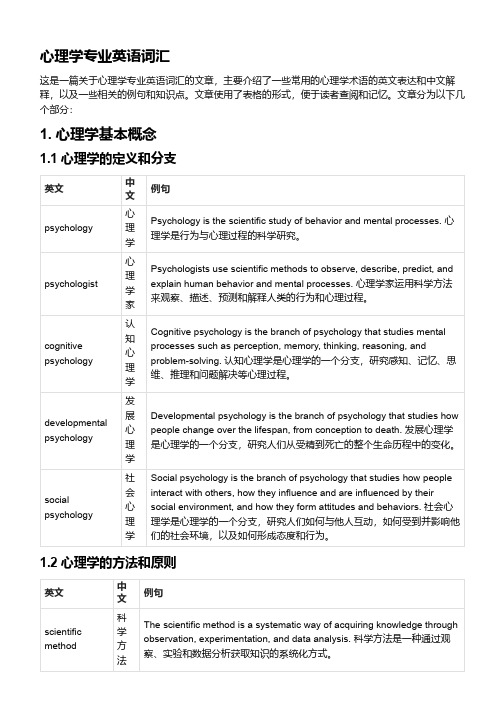
心理学专业英语词汇这是一篇关于心理学专业英语词汇的文章,主要介绍了一些常用的心理学术语的英文表达和中文解释,以及一些相关的例句和知识点。
文章使用了表格的形式,便于读者查阅和记忆。
文章分为以下几个部分:1. 心理学基本概念1.1 心理学的定义和分支英文中文例句psychology 心理学Psychology is the scientific study of behavior and mental processes. 心理学是行为与心理过程的科学研究。
psychologist 心理学家Psychologists use scientific methods to observe, describe, predict, and explain human behavior and mental processes. 心理学家运用科学方法来观察、描述、预测和解释人类的行为和心理过程。
cognitive psychology 认知心理学Cognitive psychology is the branch of psychology that studies mentalprocesses such as perception, memory, thinking, reasoning, andproblem-solving. 认知心理学是心理学的一个分支,研究感知、记忆、思维、推理和问题解决等心理过程。
developmental psychology 发展心理学Developmental psychology is the branch of psychology that studies how people change over the lifespan, from conception to death. 发展心理学是心理学的一个分支,研究人们从受精到死亡的整个生命历程中的变化。
social psychology 社会心理学Social psychology is the branch of psychology that studies how people interact with others, how they influence and are influenced by theirsocial environment, and how they form attitudes and behaviors. 社会心理学是心理学的一个分支,研究人们如何与他人互动,如何受到并影响他们的社会环境,以及如何形成态度和行为。
(完整)心理学专业英语复习资料
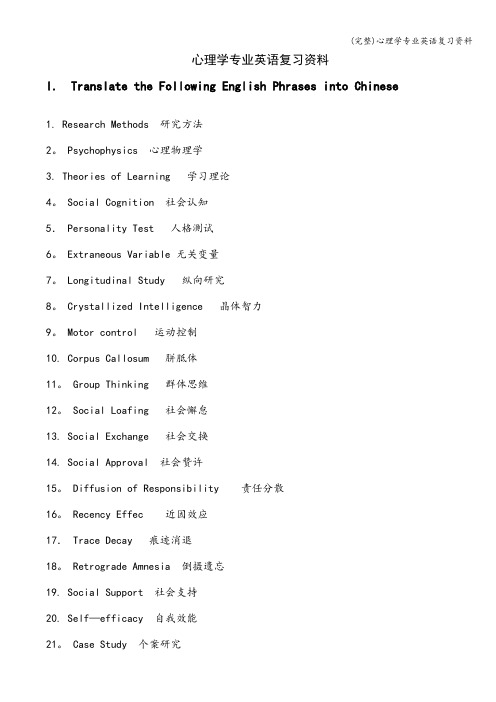
心理学专业英语复习资料I. Translate the Following English Phrases into Chinese1. Research Methods 研究方法2。
Psychophysics 心理物理学3. Theories of Learning 学习理论4。
Social Cognition 社会认知5. Personality Test 人格测试6。
Extraneous Variable 无关变量7。
Longitudinal Study 纵向研究8。
Crystallized Intelligence 晶体智力9。
Motor control 运动控制10. Corpus Callosum 胼胝体11。
Group Thinking 群体思维12。
Social Loafing 社会懈怠13. Social Exchange 社会交换14. Social Approval 社会赞许15。
Diffusion of Responsibility 责任分散16。
Recency Effec 近因效应17. Trace Decay 痕迹消退18。
Retrograde Amnesia 倒摄遗忘19. Social Support 社会支持20. Self—efficacy 自我效能21。
Case Study 个案研究II. Translate the Following Chinese Word Groups into English1。
机能主义 functionalism2。
自我实现 self—actualization3.一般规律研究法 nomothetic method4。
分层抽样 stratified sampling5. 外在信度 external reliability6. 选择性注意 selective attention7。
知觉恒常性 perceptual constancy8. 自我概念 self concept9. 液体智力 fluid intelligence10. 安全型依恋 secure attachment11. 性别图示 gender schema12。
心理学专业外语

心理学专业英语What Psychology IsWhy people do the things they do is an age-oldquestion. However, psychology--the science concernedwith behavior, both humans and animals--is only about125 years old. Despite its youth, it is a broad discipline,essentially spanning subject matter from biology tosociology. Biology studies the structures and functions of living organisms. Sociology examines how groupsfunction in society. Psychologists study two criticalrelationships: one between brain function and behavior, and one between the environment and behavior. Asscientists, psychologists follow scientific methods, usingcareful observation, experimentation, and analysis. Butpsychologists also need to be creative in the way theyapply scientific findings.Psychologists are frequently innovators, evolvingnew approaches from established knowledge to meetchanging needs of people and societies. They develop theories and test them through their research. As this researchyields new information, these findings become part of the body of knowledge that practitioners call onin their work with clients and patients. Psychology is atremendously varied field. Psychologists conduct bothbasic and applied research, serve as consultants tocommunities and organizations, diagnose and treatpeople, and teach future psychologists and other types of students. They test intelligence and personality. Theyassess behavioral and mental function and well-being,stepping in to help where appropriate. They study howhuman beings relate to each other and also to machines, and they work to improve these relationships. And with America undergoing large changes in its populationmakeup, psychologists bring important knowledge andskills to understanding diverse cultures.Many psychologists work independently. They also team up with other professionals--for example, otherscientists, physicians, lawyers, school personnel, computer experts, engineers, policy makers, and managers--tocontribute to every area of society. Thus we find them inlaboratories, hospitals, courtrooms, schools and universities, community health centers, prisons, and corporateoffices. Psychologists traditionally study both normal and abnormalfunctioning, and also treat patients withmental and emotional problems. Today, they areincreasingly concentrating on behaviors that affect the mental and emotional health and mental processes of healthy human beings. For example, they work with business executives, performers, and athletes to combat stress and improve performance. They advise lawyers on jury selection and collaborate with educators on school reform. They show up immediately following a disaster such as a plane crash or bombing, to help victims and bystanders recover from the trauma, or shock, of the event. They team with law enforcement and public health officials to analyze the causes of such events and prevent their occurrence. Involved in all aspects of our fast-paced world, psychologists must keep up with what's happening all around us. When you're a psychologist, your education never ends.Psychology is a discipline with a bright future. Among fields requiring a college degree, it is expected to be the third fastest-growing field in America through the year 2005 and to continue to grow steadily for at least another dozen years after that.Opportunities for work in psychology are expanding in number and scope. The move toward preventing illness, rather than merely diagnosing and treating it, requires people to learn how to make healthy behavior a routine part of living. Indeed, many of the problems facing society today are problems about behavior, for example, drug addiction, poor personal relationships, violence at home and in the street, and the harm we do to our environment. Psychologists contribute solutions to problems through careful collection of data, analysis of data, and development of intervention strategies--in other words, by applying scientific principles, the hallmark of psychology.In addition, an aging America is leading to more research and practice in adapting our homes and workplaces for older people. The promises of the electronic revolution demand more user-friendly technologies and training. More women in the workplace calls for employers to accommodate the needs of families. Psychologists are helping employers to make the changes that are needed. The diversity of America today calls for psychologists to develop and refine therapies to meet the unique needs of different ethnic groups.Furthermore, research advances in learning and memory, and the integration of physical and mental health care, make psychology more exciting than ever.Most psychologists say they love their work. They cite the variety from day to day and the flexibility of their schedules. They are thrilled by the most exciting changes taking place in the field, from working with primary care physicians to using computers. Most of all, they are committed to helping people manage the ups and downs of daily life. The study of psychology is also good preparation for many other professions. Many employers are interested in the skills that psychology majors bring to collecting, analyzing, and interpreting data, and their experience with statistics and experimental design. The Job Outlook for the Next Two DecadesPsychology graduates are generally pleased with the way what they studied in school helped prepare them for both life and work. A woman who opened her own business shortly after earning a baccalaureate in psychology explains, "After all, psychology is the business of life." Psychology graduates continue to be excited by the changes taking place in the field that relate to what they are now doing.Doctoral GraduatesAs might be expected, the highest paid and greatest range of jobs in psychology are available to doctoral graduates. Although the number of doctoral graduates has at least doubled over the past 12 years, the demand continues to meet the supply. Furthermore, unemployment and underemployment rates for doctoral psychologists are slightly below the average for other scientists and engineers. Few drop out of the field. The greatest expansion of career opportunities for doctoral psychologists in the last decade have been in the subfields of clinical, counseling, school, health, industrial and educational psychology. As a consequence portionally fewer new doctorates have headed into faculty positions as compared with the past.Master's GraduatesThe number of psychology students who pursue a terminal master's degree has increased sixfold since 1960. Competition for positions inpsychology-related jobs is keen; nevertheless, approximately one-third of those with a master's degree in psychology find such work. Many handle research and data collection and analysis in universities, government, and private companies. Others find jobs in health, industry, and education, the primary work settings for psychology professionals with master's degrees. With growing recognition of the role of the psychologist in the community, more jobs for psychologists with master's degrees may also become available in community mental health centers. Psychologists with master's degrees often work under the direction of a doctoral psychologist, especially in clinical, counseling, school, and testing and measurement psychology.Some jobs in industry, for example, in organizational development and survey research, are held by both doctoral- and master's-level graduates. But industry and government jobs in compensation, training, data analysis, and general personnel issues are often filled by professionals with master's degrees in psychology.Bachelor's GraduatesSome students stop with a bachelor's degree in psychology and find work related to their college major. For example, they may be assistants in rehabilitation centers. If they meet state certification requirements, they can teach psychology in high school.But the study of psychology at the bachelor's level is also a fine preparation for many other professions. In fact, psychology is the second most popular undergraduate major behind business administration. In 1996, about 65,000 college seniors graduated with a degree in psychology, but many were not necessarily interested in a career as a psychologist. Of these 65,000 students, less than1 in 10 enrolled in graduate work in psychology. These students often possess good research and writing skills, are good problem solvers, and have well-developed, higher-level thinking ability when it comes to analyzing, synthesizing, and evaluating information. Most find jobs in administrative support, public affairs, education, business, sales, service industries, health, the biological sciences, and computer programming. They work as employment counselors, correction counselor trainees, interviewers, personnel analysts, probation officers, and writers. Two-thirds believe their job is closely or somewhat related to their psychology background and that their jobs hold career potential.Psychology majors have many qualities that are attractive to job recruiters. Employers find that psychology graduates possess strong people skills. And psychology majors also value these skills themselves. "Once you learn the principles of human behavior," says a banker with a bachelor's degree in psychology, "they're always at the top of the mind,' ready to be used. You don't have to stumble across them by accident."What Psychologists Do and Where They Do ItPsychology is an extraordinarily diverse field with hundreds of career paths. Some specialties, like caring for mentally ill people, are familiar to most of us. Others, like helping with the design of advanced computer systems or studying how we remember things, are less well known. What all psychologists have in common is a shared interest in mind and behavior, both human and animal. In their work, they draw on an ever-expanding body of scientific knowledge about how we think, act, and feel, and apply the information to their special areas of expertise. Among psychologists, researchers spend most of their time generating knowledge; practitioners apply the knowledge; and some psychologists do both.In addition to their particular mix of science and practice, psychologists can be distinguished in terms of where they work. Many psychologists work in more than one setting. For instance, college professors often consult for industry or see clients on a part-time basis. Although it's possible to identify a host of different work settings, for the purpose of this booklet, we'll consider some of the most prominent examples. Getting Ready to Work in PsychologyIf you are interested in a career as a psychologist, you have to complete graduate school with a major in psychology.Take time to research your choices. The program should match your interests. For example, some psychology departments may specialize in a subfield of psychology that appeals to you. In addition, investigate the areas of expertise and research interests of individual faculty members ifyour career interest lies ina specific type of research.A graduate school's department of psychology is the best source of information about the nature of its program and its admission requirements. Throughout the application process, discuss your plans with your psychology faculty advisor. Apply to a number of programs that offer you a reasonable chance of acceptance. The American Psychological Association has many resources to help you. Contact the APA Education Directorate at 750 First Street, NE, Washington, DC 20002-4242.HIGH SCHOOL PREPARATIONA strong academic high school education is a good beginning for a career in psychology. Courses in science, math, English, history, social studies, and a foreign language are important. Science and math are particularly important because they provide the necessary skills for research and analysis in college psychology courses. Some high schools offer a course in psychology, which can give you a taste of what the field is about. You can also find a volunteer job where psychologists work, or read about psychology in newspapers and magazines to explore the field. BACHELOR'S DEGREEMost four-year colleges and universities require a blend of research and liberal arts courses for a bachelor's degree in psychology. The courses usually include introductory psychology, experimental psychology, and statistics. Other required courses can be in learning, personality, abnormal psychology, social psychology, developmental psychology, physiological or comparative psychology, history and systems, and tests and measurement. Typically, you will be ready to take electives in psychology by the time you are a college junior. It is a good time to make graduate school plans so you can make wise choices about future courses and extracurricular activities during the last two years of college. Know, however, that as long as you've taken some electives in psychology, you don't always need to have a bachelor's in psychology to get into a graduate program in the field.The Value of the Undergraduate DegreePsychology majors, whether or not they have gone on to other careers, cite courses in the principles of human behavior as especially important to life after college. The additional insight gained from these courses into what motivates people to perform at their peak helps them, whether theyare functioning as parents at home or managers on the job.Many bachelor's degree holders credit their college psychology courses with teaching them how people, including themselves, learn. "I use information on learning reinforcement every time I conduct a training session for my employees," says a manager in a consumer products company.Above all, it is the rigorous training in the scientific method—the need to do thorough, objective research, analyze data logically, and put forth the findings with clarity—that stands psychology majors in good stead as they pursue their future careers.GRADUATE SCHOOLMost graduate departments require that you take a standard aptitude test, usually the Graduate Record Examination (GRE). Although programs vary in the weight they attach to test scores, successful applicants typically score well above 500 on both the verbal and quantitative portions of the GRE. Determine if your GRE scores will qualify you for consideration by the institution to which you would like to apply. Competition for spaces in graduate school is keen.Master's DegreeUndergraduate course requirements for a terminal master's degree are relatively few: usually, a background in introductory or general psychology, experimental psychology with a laboratory course, and statistics. The university usually takes the undergraduate grade point average (GPA) into account, too.A recent survey of 26 psychology master's programs shows that the most commonly required courses once you are in the master's program are those with industrial/organizational content, statistics, and research design. Course work at the master's level often also includes study in ethics, assessment, program evaluation, and personality related topics as well.A master's degree in psychology, along with preparation in the natural sciences or mathematics, is increasingly valued by doctoral programs in psychology. Each doctoral program also decides which credits it will accept for transfer. Occasionally, students need to repeat some course work. A few institutions will not accept a master's degree from any school other than their own.Doctoral DegreeEach school determines its own entrance requirements. Some doctoral programs require applicants to have a master's degree in psychology. For others, students can enter the doctoral programs with a bachelor's degree and work their way right through to a doctorate degree. Earning a doctoral degree typically requires at least four years and often takes up to seven years of study after the bachelor's degree. Early in the graduate program, you will probably take course work in the core areas of psychology. You will work with a professor to learn how to do research; you'll also study how psychological research is applied to life situations. Once you have completed all the course work, you must pass a comprehensive exam and write and defend a dissertation.If you want to be a clinical, counseling, or school psychologist, you will also have to complete a one year internship as part of your doctoral study in these areas of practice. You may wish to consider a doctoral program in a professional school rather than at a traditional university. Professional schools place greater emphasis on training students for professional practice and less emphasis on research. Some universities and professional schools offer a PsyD in lieu of the traditional doctoral degree. In choosing applicants, these programs may look for candidates who already have clinical experience or other work experience in applied psychology.Choosing an Accredited SchoolIf you want to be a clinical, counseling or school psychologist it's important to know the accreditation status of the programs to which you are applying. Programs that prepare students for careers in basic and applied research or for basic academic careers are not subject to an accreditation process, but are nonetheless some of the most rigorous schools in the country.There are two kinds of accreditation: institutional and specialized. Institutional accreditation certifies that an institution has met minimum standards of quality. It is granted by one of seven regional accrediting organizations recognized for this purpose by the U.S. Department of Education.Specialized accreditation only applies to professional programs; it means that the program meets the minimal standards of quality as defined by that profession for the practice of psychology. In the field of psychology,specialized accreditation is granted by the American Psychological Association. Historically, this accreditation has applied only to doctoral programs, predoctoral internships and in clinical, counseling, and school psychology. In some states you have to graduate from an APA-accredited program, predoctoral internship and to be licensed or certified as an independent clinical, counseling psychologist or school psychologist. In addition, some employers demand that candidates for clinical, counseling, and school psychology jobs hold such credentials.For more information about accredited schools and programs, contact the APA Education Directorate at 750 First Street, NE Washington, DC 20002-4242; e-mail: education@.If You Need Financial AidYou may be able to get financial aid to attend both undergraduate and graduate school. Assistance comes in different forms: fellowships, scholarships, grants or subsidies, work study programs, federal loans, and teaching or research assistantships. Graduate assistantships and work study require part time work.Students seeking financial aid for a graduate degree should get advice as early as possible. Consult with both the psychology office and the office of financial aid on your own campus and also with the office of financial aid at the school to which you are applying. Students of ethnic minority background should also contact the APA Minority Fellowship Training Program.Licensure and CertificationTo practice as a clinical, counseling, or social psychologist independently and without supervision anywhere in the United States, you must be licensed or certified. Before granting you permission to take the exam, the state board in charge of licensing or certification will review your educational background. A doctoral degree does not automatically make you eligible; requirements vary from state to state. At a minimum, states require that the doctorate be in psychology or a field of study "primarily psychological in nature" and that it be from a regionally accredited institution. You also must have had at least two years of supervised professional experience.心理学专业名词中英文对照感觉记忆(SM)—sensory memory短期记忆(STM)—short-term M.长期记忆(LTM)—long-term memory复诵---rehearsal预示(激发)----priming童年失忆症---childhoodamnesia视觉编码(表征)---visual code (representation)听觉编码—acoustic code运作记忆---working memory语意性知识—semantic knowledge记忆扫瞄程序—memory scanning procedure竭尽式扫瞄程序-exhaustive S.P.自我终止式扫瞄—self-terminated S..程序性知识—procedural knowledge命题(陈述)性知识--propositional(declarative)knowledge 情节(轶事)性知识—episodic K.讯息处理深度—depth of processing精致化处理—elaboration登录特殊性—coding specificity记忆术—mnemonic位置记忆法—method of loci字钩法—peg word(线)探索(测)(激发)字—prime关键词---key word命题思考----propositional thought心像思考---imaginal thought行动思考---motoric thought概念---concept原型----prototype属性----property特征---feature范例策略--exemplar strategy语言相对性(假说)—linguistic relativity th.音素---phoneme词素---morpheme(字词的)外延与内涵意义—denotative & connotative meaning (句子的)表层与深层结构—surface & deep structure语意分析法---semantic differential 全句语言—holophrastic speech过度延伸---over-extension电报式语言—telegraphic speech关键期----critical period差异减缩法---differencereduction方法目的分析---means-ends analysis倒推---working backward动机---------motive自由意志------free will决定论------determinism本能-----------instinct种属特有行为-----species specific驱力----drive诱因------incentive驱力减低说---drive reduction th.恒定状态(作用)—homeostasis原级与次级动机—primary & secondary M.功能独立—functional autonomy下视丘侧部(LH)—lateral hypothalamus脂肪细胞说----fat-cell theory.下视丘腹中部(VMH)—ventromedial H定点论---set point th.CCK───胆囊调节激素第一性征---primary sex characteristic 第二性征---secondary sex characteristic自我效能期望—self-efficiency expectancy 内在(发)动机—intrinsic motive外在(衍)动机—extrinsic motive成就需求---N. achievement需求层级—hierarchy of needs自我实现---self actualization冲突----conflict多项仪---polygraph肤电反应----------GSR(认知)评估---(cognitive appraisal)脸部回馈假说---facial feedback hypothesis(生理)激发----arousal挫折-攻击假说---frustration-aggression hy.替代学习----vicarious learning发展------development先天-----nature后天-----nurture成熟-------maturation(视觉)偏好法-----preferential method习惯法-----habituation视觉悬崖-----visual cliff剥夺或丰富(环境)---deprivation or enrichment of env.基模----schema同化----assimilation调适-----accommodation平衡----equilibrium感觉动作期----sensorimotor stage物体永久性----objective permanence运思前期----preoperational st.保留概念----conservation道德现实主义---moral realism具体运思期-----concrete operational形式运思期----formal operational st.前俗例道德---pre-conventional moral俗例道德----conventional moral超俗例道德----post-conventional moral气质----temperament依附---attachment性别认定---gender identity性别配合----sex typing性蕾期---phallic stage恋亲冲突—Oedipal conflict认同-----identification社会学习----social learning情结---complex性别恒定----gender constancy青年期----adolescence青春期-- -puberty第二性征---secondary sex characteristics认同危机---identity crisis定向统合---identity achievement早闭型统合---foreclosure未定型统合---moratorium迷失型统合---identity diffusion传承---generativity心理动力------psycho-dynamics心理分析------psychoanalysis行为论-------behaviorism心理生物观---psycho-biological perspective认知---------cognition临床心理学家-clinical psychologist谘商--------counseling人因工程-------human factor engineering组织--------organization潜意识---------unconsciousness完形心理学---Gestalt psychology感觉------------sensation知觉--------perception实验法--------experimental method独变项-------independent variable依变项--------dependent V.控制变项------control V.生理------------physiology条件化---------conditioning学习------------learning比较心理学---comparative psy.发展-------------development社会心理学---social psy.人格--------------personality心理计量学—psychometrics受试(者)---------subject实验者预期效应—experimenter expectancy effect 双盲法-----double—blind实地实验--------field experiment相关-----------correlation调查-------------survey访谈-----------interview个案研究-------case study观察-----------observation心理测验-------psychological test纹理递变度-----texture gradient注意------------attention物体的组群---grouping of object型态辨识—pattern recognition形象-背景----figure-ground接近律--------proximity相似律--------similarity闭合律-------closure连续律--------continuity对称律-------symmetry错觉-----------illusion幻觉----------delusion恒常性--------constancy大小----------size形状-----------shape位置---------- ***单眼线索-----monocular cue线性透视----linear- perspective双眼线索-----binocular cue深度---------depth调节作用-----accommodation重迭----superposition双眼融合-----binocular fusion辐辏作用-----convergence双眼像差-----binocular disparity向度 --------- dimension自动效应-----autokineticeffect运动视差----- motion parallax诱发运动---- inducedmotion闪光运动----- stroboscopic motion上下文﹑脉络-context人工智能------artificial intelligence A.I.脉络关系作用-context effect模板匹配------template matching整合分析法---analysis-by-synthesis丰富性---------redundancy选择性---------selective无意识的推论-unconscious inferences运动后效---motion aftereffect特征侦测器—feature detector激发性---excitatory抑制性----inhibitory几何子---geons由上而下处理—up-down process由下而上处理---bottom-up process连结者模式---connectionist model联结失识症---associative agnosia脸孔辨识困难症---prosopagnosia意识--conscious(ness)意识改变状态---altered states of consciousness无意识----unconsciousness前意识---------preconsciousness内省法---introspection边缘注意---peripheralattention多重人格-----multiple personality午餐排队(鸡尾酒会)效应—lunch line(cocktail party) effect 自动化历程----automatic process解离----dissociate解离认同失常----dissociative identity disorder快速眼动睡眠----REM dream非快速眼动睡眠—NREM dream神志清醒的梦----lucid dreaming失眠---insomnia显性与隐性梦---manifest & latern content心理活动性psychoactive冥想------meditation抗药性---- tolerance戒断----withdrawal感觉剥夺---sensory deprivation物质滥用----substance abuse成瘾--------physical addiction物质依赖----sub. dependence戒断症状----withdrawal symptom兴奋剂--stimulant幻觉(迷幻)剂----hallucinogen镇定剂---sedative﹐抑制剂—depressant酒精中毒引起谵妄—delirium tremens麻醉剂---narcotic催眠-------hypnosis催眠后暗示----posthypnotic suggestion 催眠后失忆posthypnotic amnesia超心理学---parapsychology超感知觉extrasensory perception ESP 心电感应---telepathy超感视---clairvoyance预知---precognition心理动力—psycokinesis PK受纳器-----receptor绝对阈----absolute threshold差异阈----------difference threshold 恰辨差------- -JND韦伯律---------Weber's law心理物理-----psychophysical费雪纳定律---Fechner's law 频率-----frequency振幅----------amplitude音频-------pitch基音----------fundamental tone倍音-----overtone和谐音-------harmonic音色------timbre白色噪音----white noise鼓膜-----eardrum耳蜗----------cochlea卵形窗—oval window圆形窗-------round window前庭-----vestibular sacs半规管-------semicircular canals角膜-------cornea水晶体-------lens虹膜------------iris瞳孔----------pupil网膜---------retina睫状肌-------ciliary muscle调节作用---accommodation脊髓---------spinal cord反射弧--------reflex arc脑干---------brain stem计算机轴性线断层扫描-- CAT 或CT PET---正子放射断层摄影MRI-----磁共振显影延脑----medulla桥脑-----pons小脑----cerebellum网状结构---reticular formationRAS----网状活化系统视丘----thalamus下视丘----hypothalamus大脑----cerebrum脑(下)垂体(腺)—pituitary gland 脑半球---cerebral hemisphere皮质---cortex胼胝体----corpus callosum边缘系统------limbic system海马体----hippocampus杏仁核--------amygdala中央沟---central fissure侧沟-----------lateral fissure脑叶------lobe同卵双生子----identical twins异卵双生子—fraternal twins古典制约--classical conditioning操作制约---operant conditioning。
(完整版)心理学专业英语
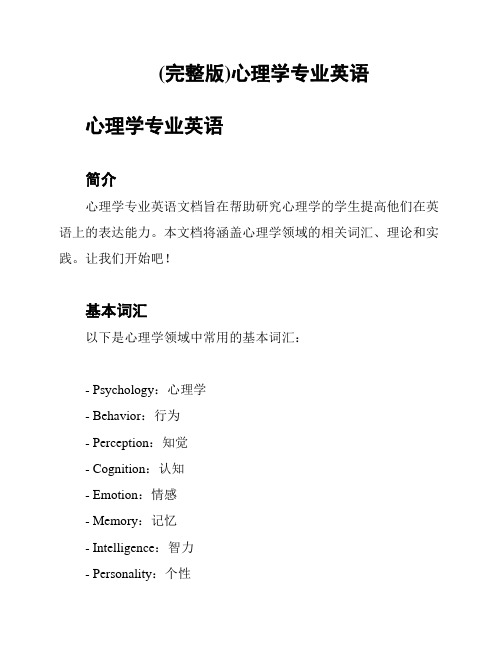
(完整版)心理学专业英语心理学专业英语简介心理学专业英语文档旨在帮助研究心理学的学生提高他们在英语上的表达能力。
本文档将涵盖心理学领域的相关词汇、理论和实践。
让我们开始吧!基本词汇以下是心理学领域中常用的基本词汇:- Psychology:心理学- Behavior:行为- Perception:知觉- Cognition:认知- Emotion:情感- Memory:记忆- Intelligence:智力- Personality:个性- Development:发展- Motivation:动机理论心理学涵盖了许多理论,以下是其中一些常见的心理学理论:1. 行为主义理论:行为主义认为行为是在环境刺激的影响下形成的,强调外部刺激对行为的影响。
2. 心理动力学理论:心理动力学理论关注潜意识和个人经验对行为的影响,强调个体内在的冲突和动机。
3. 认知心理学理论:认知心理学关注个体的思维过程和信息处理,强调思维、语言和决策对行为的影响。
4. 社会文化心理学理论:社会文化心理学关注社会和文化对行为的影响,强调个体和环境的互动。
实践心理学的实践包括以下几个方面:1. 临床心理学:临床心理学关注诊断和治疗心理问题,包括心理疾病和心理障碍。
2. 教育心理学:教育心理学关注研究和教育过程中的心理因素,帮助提高学生的研究成果和心理健康。
3. 社会心理学:社会心理学关注个体在社会环境中的行为和互动,研究社会认知、群体行为和人际关系。
4. 工业组织心理学:工业组织心理学关注组织中的心理因素,帮助提高工作效率和员工满意度。
希望这份文档能帮助您更好地理解心理学专业英语。
如有任何问题,请随时联系我们。
祝您学业进步!。
心理学专业英语
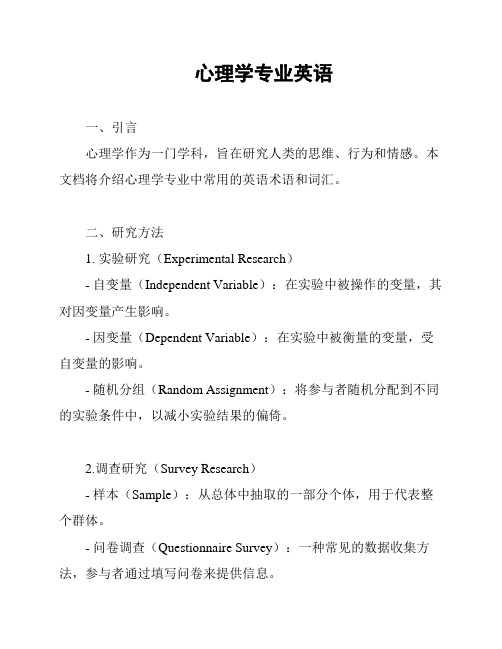
心理学专业英语一、引言心理学作为一门学科,旨在研究人类的思维、行为和情感。
本文档将介绍心理学专业中常用的英语术语和词汇。
二、研究方法1. 实验研究(Experimental Research)- 自变量(Independent Variable):在实验中被操作的变量,其对因变量产生影响。
- 因变量(Dependent Variable):在实验中被衡量的变量,受自变量的影响。
- 随机分组(Random Assignment):将参与者随机分配到不同的实验条件中,以减小实验结果的偏倚。
2.调查研究(Survey Research)- 样本(Sample):从总体中抽取的一部分个体,用于代表整个群体。
- 问卷调查(Questionnaire Survey):一种常见的数据收集方法,参与者通过填写问卷来提供信息。
三、主要理论1.行为主义(Behaviorism)- 刺激-反应(Stimulus-Response):行为主义认为,行为是对刺激的直接反应。
2.认知心理学(Cognitive Psychology)- 情绪(Emotion):主观体验和生理反应的一种状态,通常与特定刺激有关。
- 记忆(Memory):对于信息的编码、存储和检索能力。
- 研究(Learning):通过经验和实践获取知识和技能的过程。
四、发展领域1.临床心理学(Clinical Psychology)- 临床评估(Clinical Assessment):通过各种测试和观察手段,评估个体的心理状况。
- 治疗(Therapy):利用心理和行为干预手段,帮助个体解决心理困扰。
2.社会心理学(Social Psychology)- 社会认知(Social Cognition):研究个体如何感知、记忆和思考与他人相关的信息。
五、结论本文档提供了心理学专业常用英语术语和词汇的简要介绍,希望能帮助读者更好地理解和研究心理学领域的知识。
参考文献:- Smith, J. (2010). Introduction to Psychology. Publisher.- Johnson, L. (2015). Key Concepts in Cognitive Psychology. Publisher.。
(完整版)心理学专业英语词汇
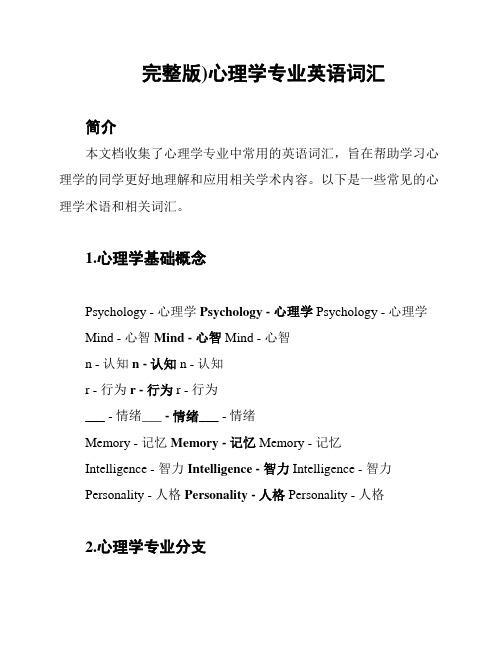
完整版)心理学专业英语词汇简介本文档收集了心理学专业中常用的英语词汇,旨在帮助学习心理学的同学更好地理解和应用相关学术内容。
以下是一些常见的心理学术语和相关词汇。
1.心理学基础概念Psychology - 心理学Psychology - 心理学Psychology - 心理学Mind - 心智Mind - 心智Mind - 心智n - 认知n - 认知n - 认知r - 行为r - 行为r - 行为___ - 情绪___ - 情绪___ - 情绪Memory - 记忆Memory - 记忆Memory - 记忆Intelligence - 智力Intelligence - 智力Intelligence - 智力Personality - 人格Personality - 人格Personality - 人格2.心理学专业分支___ - 发展心理学___ - 发展心理学___ - 发展心理学___ - 社会心理学___ - 社会心理学___ - 社会心理学___ - 认知心理学___ - 认知心理学___ - 认知心理学___ - 临床心理学___ - 临床心理学___ - 临床心理学___ - 教育心理学___ - 教育心理学___ - 教育心理学Industrial-___(I/O) Psychology - 工业组织心理学Industrial-___(I/O) Psychology - 工业组织心理学Industrial-___(I/O) Psychology - 工业组织心理学___ - 神经心理学___ - 神经心理学___ - 神经心理学3.心理学研究方法___ - 实验___ - 实验___ - 实验Survey - 调查Survey - 调查Survey - 调查n - 观察n - 观察n - 观察Interview - 访谈Interview - 访谈Interview - 访谈nnaire - 问卷nnaire - 问卷nnaire - 问卷n - 相关性n - 相关性n - 相关性Statistical Analysis - 统计分析Statistical Analysis - 统计分析Statistical Analysis - 统计分析Sample - 样本Sample - 样本Sample - 样本n - 总体n - 总体n - 总体4.心理学理论Psychoanalysis - 精神分析Psychoanalysis - 精神分析Psychoanalysis - 精神分析rism - 行为主义rism - 行为主义rism - 行为主义___ - 认知理论___ - 认知理论___ - 认知理论___ - 人本主义心理学___ - 人本主义心理学___ - 人本主义心理学___ - 生物心理学___ - 生物心理学___ - 生物心理学___ - 进化心理学___ - 进化心理学___ - 进化心理学Social learning theory - 社会学习理论Social learning theory - 社会学习理论Social learning theory - 社会学习理论5.心理学诊断和治疗方法Diagnosis - 诊断Diagnosis - 诊断Diagnosis - 诊断___ - 治疗___ - 治疗___ - 治疗Counseling - 咨询Counseling - 咨询Counseling - 咨询___ - 心理治疗___ - 心理治疗___ - 心理治疗___ - 药物治疗___ - 药物治疗___ - 药物治疗___ (CBT) - 认知行为疗法___ (CBT) - 认知行为疗法___ (CBT) - 认知行为疗法Group ___ - 团体疗法Group ___ - 团体疗法Group ___ - 团体疗法___ - 艺术疗法___ - 艺术疗法___ - 艺术疗法6.心理学实验设计Independent Variable - 自变量Independent Variable - 自变量Independent Variable - 自变量___ Variable - 因变量___ Variable - 因变量___ Variable - 因变量Control Group - 对照组Control Group - 对照组Control Group - 对照组Experimental Group - 实验组Experimental Group - 实验组Experimental Group - 实验组Random Assignment - 随机分配Random Assignment - 随机分配Random Assignment - 随机分配Single-Blind Study - 单盲研究Single-Blind Study - 单盲研究Single-Blind Study - 单盲研究Double-Blind Study - 双盲研究Double-Blind Study - 双盲研究Double-Blind Study - 双盲研究7.心理测量与评估Psychological Assessment - 心理测量Psychological Assessment - 心理测量Psychological Assessment - 心理测量Intelligence Test - 智力测试Intelligence Test - 智力测试Intelligence Test - 智力测试Personality Test - 人格测验Personality Test - 人格测验Personality Test - 人格测验Psychological Test - 心理测验Psychological Test - 心理测验Psychological Test - 心理测验Validity - 有效性Validity - 有效性Validity - 有效性Reliability - 可靠性Reliability - 可靠性Reliability - 可靠性___ - 标准化___ - 标准化___ - 标准化以上是一些常用的心理学专业英语词汇,希望对学习心理学的同学有所帮助。
心理学专业英语总结(完整)
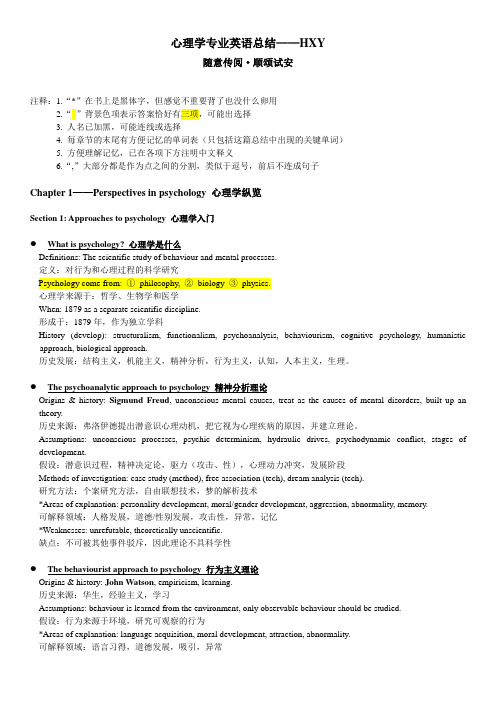
心理学专业英语总结——HXY随意传阅·顺颂试安注释:1.“*”在书上是黑体字,但感觉不重要背了也没什么卵用2.“”背景色项表示答案恰好有三项,可能出选择3. 人名已加黑,可能连线或选择4. 每章节的末尾有方便记忆的单词表(只包括这篇总结中出现的关键单词)5. 方便理解记忆,已在各项下方注明中文释义6.“,”大部分都是作为点之间的分割,类似于逗号,前后不连成句子Chapter 1——Perspectives in psychology 心理学纵览Section 1: Approaches to psychology 心理学入门●What is psychology? 心理学是什么Definitions: The scientific study of behaviour and mental processes.定义:对行为和心理过程的科学研究Psychology come from: ①philosophy, ②biology ③physics.心理学来源于:哲学、生物学和医学When: 1879 as a separate scientific discipline.形成于:1879年,作为独立学科History (develop): structuralism, functionalism, psychoanalysis, behaviourism, cognitive psychology, humanistic approach, biological approach.历史发展:结构主义,机能主义,精神分析,行为主义,认知,人本主义,生理。
●The psychoanalytic approach to psychology 精神分析理论Origins & history: Sigmund Freud, unconscious mental causes, treat as the causes of mental disorders, built up an theory.历史来源:弗洛伊德提出潜意识心理动机,把它视为心理疾病的原因,并建立理论。
(完整)心理学专业英语词汇汇总,推荐文档
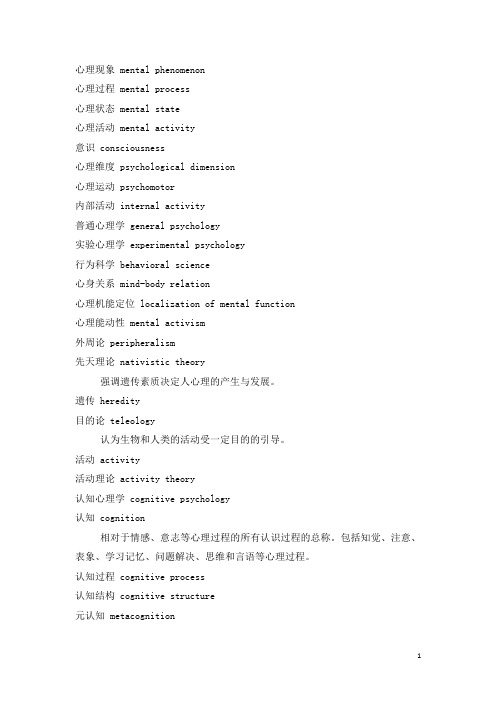
心理现象 mental phenomenon心理过程 mental process心理状态 mental state心理活动 mental activity意识 consciousness心理维度 psychological dimension心理运动 psychomotor内部活动 internal activity普通心理学 general psychology实验心理学 experimental psychology行为科学 behavioral science心身关系 mind-body relation心理机能定位 localization of mental function心理能动性 mental activism外周论 peripheralism先天理论 nativistic theory强调遗传素质决定人心理的产生与发展。
遗传 heredity目的论 teleology认为生物和人类的活动受一定目的的引导。
活动 activity活动理论 activity theory认知心理学 cognitive psychology认知 cognition相对于情感、意志等心理过程的所有认识过程的总称。
包括知觉、注意、表象、学习记忆、问题解决、思维和言语等心理过程。
认知过程 cognitive process认知结构 cognitive structure元认知 metacognition认知失调 cognitive dissonance认知地图 cognitive map认知技能 cognitive skill认知方式 cognitive style信息 information信息论 information theory信息加工 information processing信息加工心理学 information processing psychology 信息加工理论 information processing theory信息加工模型 information processing model中央处理器模型 central processor model信息储存 information storage信息提取 information retrieval人工智能 artificial intelligence, AI计算机类比 computer analogy计算机模拟 computer simulation计算机模型 computer model唯心主义心理学 idealistic psychology意动心理学 act psychology唯意志论 voluntarism唯灵论 spiritualism强调超自然精神作用。
- 1、下载文档前请自行甄别文档内容的完整性,平台不提供额外的编辑、内容补充、找答案等附加服务。
- 2、"仅部分预览"的文档,不可在线预览部分如存在完整性等问题,可反馈申请退款(可完整预览的文档不适用该条件!)。
- 3、如文档侵犯您的权益,请联系客服反馈,我们会尽快为您处理(人工客服工作时间:9:00-18:30)。
随意传阅•顺颂试安注释:1•“ * ”在书上是黑体字,但感觉不重要背了也没什么卵用2•“ ”背景色项表示答案恰好有三项,可能出选择 3. 人名已加黑,可能连线或选择4. 每章节的末尾有方便记忆的单词表(只包括这篇总结中出现的关键单词)5. 方便理解记忆,已在各项下方注明中文释义6•“,”大部分都是作为点之间的分割,类似于逗号,前后不连成句子Chapter 1 ------ P erspectives in psychology 心理学纵览Section 1: Approaches to psychology 心理学入门What is psychology? 心理学是什么Defin iti ons: The scie ntific study of behaviour and men tal processes. 定义:对行为和心理过程的科学研究Psychology come from: ① philosophy,② biology ③ physics. 心理学来源于:哲学、生物学和医学When: 1879 as a separate scientific discipline. 形成于:1879年,作为独立学科History (develop): structuralism, functionalism, psychoanalysis, behaviourism, cognitive psychology,approach, biological approach.历史发展:结构主义,机能主义,精神分析,行为主义,认知,人本主义,生理。
The psychoa nalytic approach to psychology 精神分析理论Origins & history: Sigmund Freud , unconscious mental causes, treat as the causes of mental disorders,theory.历史来源:弗洛伊德提出潜意识心理动机,把它视为心理疾病的原因,并建立理论。
Assumpti ons: uncon scious processes, psychic determ ini sm, hydraulic drives, psychody namic con flict, developme nt.假设:潜意识过程,精神决定论,驱力(攻击、性),心理动力冲突,发展阶段Methods of in vestigati on: case study (method), free associati on (tech), dream an alysis (tech). 研究方法:个案研究方法,自由联想技术,梦的解析技术*Areas of expla nati on: pers on ality developme nt, moral/ge nder developme nt, aggressi on, abn ormality, memory. 可解释领域:人格发展,道德 /性别发展,攻击性,异常,记忆 *Weaknesses: unrefutable, theoretically unscientific. 缺点:不可被其他事件驳斥,因此理论不具科学性 The behaviourist approach to psychology行为主义理论Origins & history: Joh n Wats on , empiricism, lear ning. 历史来源:华生,经验主义,学习Assumpti ons: behaviour is lear ned from the environment, only observable behaviour should be studied.心理学专业英语总结HXYhuma ni sticbuilt up anstages of假设:行为来源于环境,研究可观察的行为*Areas of expla nati on: Ian guage acquisiti on, moral developme nt, attract ion, abno rmality.可解释领域:语言习得,道德发展,吸引,异常The huma ni stic approach to psychology 人本主义理论Origins & history: conscious free will, aimed to investigate all the uniquely human aspects of experienee, Maslow and self- actualise, Carl Rogers and client-centred therapy.历史来源:自由意志,人类特有的经验,马斯洛的自我实现,罗杰斯的来访者中心疗法Assumptions: study human not other animal, must be meaningful to human, study internal experience and free will, study the in dividual case, studied in their environmen tal con text.假设:关于人的观点必须出于对于人的研究,研究应对人类有用,研究内部体验和自由意志,研究个案,研究应在具体环境下Areas of expla nati on: pers on ality/self ide ntity, motivati on, abno rmality.可解释领域:人格/自我认同,动机,异常The cog nitive approach to psychology 认知主义理论Origi ns and history: computer, i nformati on processors ‘internal men tal processes.历史来源:计算机,类比人脑为信息加工者,内部心理过程。
Jerome Brun er*Areas: memory, perception, attention, artificial intelligence, social cognition, cognitive development.可解释领域:记忆,知觉,注意,人工智能,社会认知,认知发展*Practical applicati ons: memory, educati on, therapy, pers on ality assessme nt.实践应用:记忆,教育,治疗,人格测评The biological approach to psychology 生理心理学Roger Sperry 罗杰•斯佩里*Areas of expla nati on: gen der developme nt, aggressi on, abno rmality, memory, motivatio n, aware ness.可解释领域:性别发展,攻击性,异常,记忆,动机,意识*Practical applicati on: localisati on of function, therapy.实践应用:功能定位说,治疗The reducti onism debate in psychology 关于还原论的争论1. Reductionism 还原论Assumptions: explaining a phenomenon by breaking it down into its constituent parts and then analysing it. 假设:通过将现象拆分成组成部分并分析的方法解释现象Again st:① oversimplificati on ② value of expla nati on ③ validity of reducti oni sm.反对理由:过度简化,解释的价值(细节/有用性),效度2. Holism & In teractio nism 整体论(与互动论)Assumptions: the whole is greater than the sum of its parts. 假设:整体优于部分*Examples: huma ni stic psychology, social psychology, psychoa nalysis, abno rmal psychology, percepti on.例子:人本,社会,精神分析,变态,知觉Again st: practical difficulty, ig nore the huge in flue nce of biology, lack the predictive power.反对理由:难于实践研究,忽略生理影响,缺乏预测力The nature-nurture debate in psychology 先后天之争1. Nature先天遗传决定论Approach: ①roots of the approach(nativist philosophy, biology, evolutionary theory) 理论根源②causes of behaviour (gen etic determ inism, in herited in flue nce, maturati onal bluepri nt, n eurochemicaland hormo nal in flue nces, brain activity)(基因、遗传、个体成熟、神经化学与荷尔蒙的影响和大脑活动。
)③methods (ge ne mapp ing, twin/adopti on study, brain sca nning, brain stimulati on /damage study, drug test)④implicatio ns (behaviour can only be cha nged through physical means) 启示⑤criticisms (reduct ioni st, n eglect environmen tal in flue nces) 过于简单,忽视环境对人行为的影响②causes of behaviour (blank slate at birth, experienee, learning from environment) 源于经验和环境学习③methods (classical and opera nt con diti oning tech niq ues, man ipulati on of social environment)研究方法(经典条件反射、操作性条件反射,改变社会环境)④implicatio ns (An ybody could be trained to do anything) 启示⑤criticisms (reductio nist, neglect inn ate in flue nces) 过于简单,忽视遗传因素在人行为中的作用3. Both*Areas of expla nati on: perceptio n, aggressi on, sex-role behaviour, abno rmality, la nguage acquisiti on.可解释领域:知觉,攻击性,性别角色行为,异常,语言获得*ln teract ion examples: percepti on, cog nitive developme nt, abno rmality, sex-role behaviour.交互作用举例:感知觉,认知发展,行为异常,性别角色行为*The sta nding of the differe nt: biopsychology, psychoa nalysis, cog nitive psychology, huma ni sm, behaviourism.二者在心理学中作用:生理心理学,精神分析,认知,人本,行为The freewill vs. Determi nism debate in psychology 自由意志理论与决定论之争1. FreewillAssumptions: humans are free to choose their behabiour, self-determining, soft determinism( William James ).假设:人类可以自由选择行为,人本质上是自我决定的,软决定论Again st: difficult to defi ne, evide nce is mostly subjective, be in compatible with the determ ini stic assumpti ons of scie nee. 反对理由:很难定义,证据主观,与决定论的科学性不匹配2. DeterminismAssumpti ons: every physical event is caused, future eve nts are en tirely predictable, emphasis on causal laws. 假设:所有物理事件都是被引起的,未来事件完全可以预测,注重因果法则Idiographic vs. Nomothetic approaches to psychology 心理学特殊规律与一般规律1. Nomothetic approach 一般规律研究法Definitions: The approach of investigating large groups of people to try to find general laws of behaviour that apply to everyone.定义:通过调查大群体的人,试图找到适用于每个人的普遍行为规律的研究方法。
